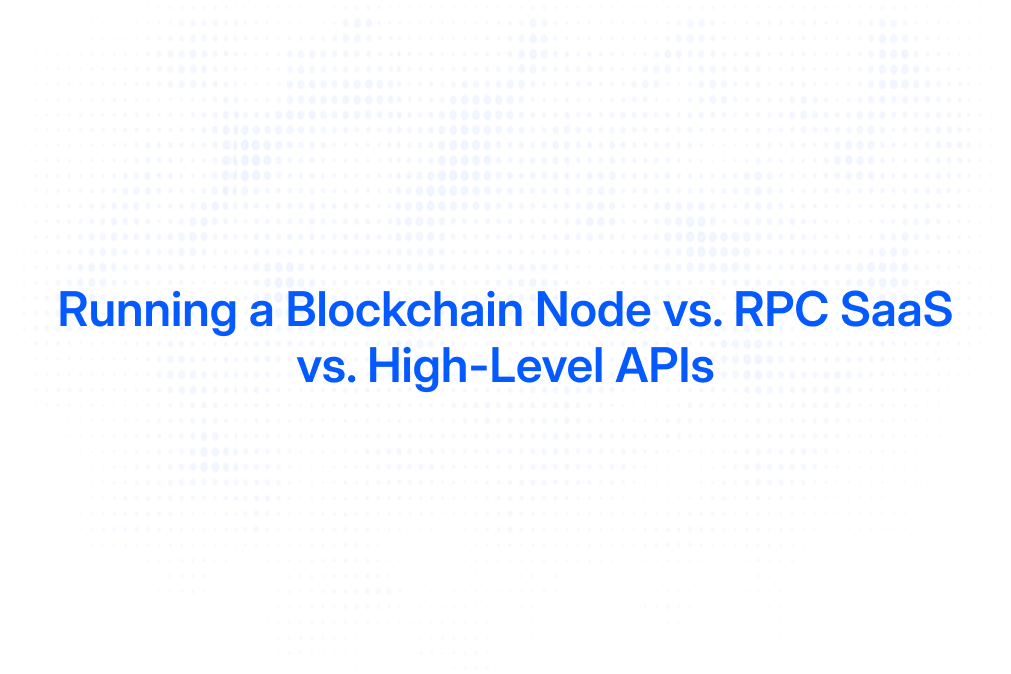Top RPC Providers in 2025 (and How to Auto-Route Them)
As blockchain applications continue to scale and diversify, the demand for reliable, fast, and cost-effective Remote Procedure Call (RPC) providers has never been higher. In 2025, the landscape of RPC providers is more competitive and sophisticated than ever, with developers seeking solutions that not only offer robust infrastructure but also intelligent routing capabilities to optimize performance and uptime.
This article explores the top RPC providers dominating the market in 2025 and delves into the emerging practice of RPC auto-routing—an essential strategy for maximizing reliability and minimizing costs in Web3 applications.
Understanding RPC Providers and Their Importance in Web3
RPC providers serve as the backbone of blockchain applications by enabling communication between decentralized apps (dApps) and blockchain networks. They facilitate requests such as querying blockchain data, submitting transactions, and interacting with smart contracts. The quality of an RPC provider directly impacts an application's responsiveness, reliability, and overall user experience.
In the early days of blockchain, many projects relied on single RPC providers, which often led to bottlenecks, outages, and increased latency. Today, the emphasis has shifted towards multi-provider strategies and intelligent routing to overcome these challenges.
Why Choose the Right RPC Provider?
Choosing the right RPC provider is critical because downtime or slow responses can result in lost transactions, frustrated users, and ultimately, diminished trust in your application. Additionally, as blockchain networks grow, so do the demands on RPC infrastructure, making scalability and cost-efficiency key considerations.
Top RPC Providers in 2025
The RPC provider market in 2025 features several leading platforms known for their reliability, global infrastructure, and innovative features. Here’s a closer look at some of the top contenders:
1. Alchemy
Alchemy remains a powerhouse in the RPC space, offering a comprehensive suite of developer tools alongside its RPC endpoints. Known for high uptime and low latency, Alchemy supports multiple blockchain networks and provides analytics that help developers monitor API usage and performance.
Its infrastructure is optimized for scalability, making it a popular choice for projects expecting rapid user growth. Alchemy’s focus on developer experience and robust documentation further cements its position as a top provider.
2. QuickNode
QuickNode is recognized for its speed and global presence, boasting data centers across multiple continents to reduce latency. It supports a wide range of blockchains and offers flexible pricing plans tailored to startups and enterprises alike.
QuickNode’s emphasis on simplicity and quick integration appeals to developers who want to launch quickly without sacrificing performance or reliability.
3. Infura
Infura, part of ConsenSys, has been a foundational RPC provider, especially for Ethereum-based applications. It offers robust infrastructure with a strong track record for uptime and security.
However, as a single-provider solution, Infura faces challenges related to vendor lock-in and potential outages, which has driven many developers to seek multi-provider alternatives or aggregators that can mitigate these risks.
4. Uniblock
Emerging as a strong alternative, Uniblock focuses on RPC auto-routing and multi-provider aggregation. By intelligently distributing requests across multiple backend providers, Uniblock enhances reliability and reduces downtime.
Its platform is designed to optimize cost and latency by selecting the best RPC endpoint dynamically, making it a compelling choice for projects aiming to future-proof their infrastructure.
What is RPC Auto-Routing and Why Does It Matter?
RPC auto-routing is a technique that automatically directs API calls to the most appropriate RPC provider based on factors like latency, availability, and cost. Instead of relying on a single provider, applications can leverage multiple endpoints simultaneously, ensuring uninterrupted service even if one provider experiences an outage.
This approach is becoming the new standard in Web3 infrastructure because it tackles several critical pain points:
- Reliability: By having failover mechanisms, auto-routing prevents downtime caused by provider outages.
- Latency Reduction: Requests can be routed to the geographically closest or fastest provider, improving response times.
- Cost Optimization: Auto-routing can balance requests to minimize expenses by prioritizing cheaper providers when appropriate.
Failover vs Load Balancing in RPC
Understanding the difference between RPC failover and load balancing is essential for implementing effective auto-routing. Failover refers to switching to a backup provider only when the primary one fails, ensuring continuity. Load balancing, on the other hand, distributes traffic evenly or based on performance metrics across multiple providers to optimize resource utilization and latency.
Advanced RPC routers combine both strategies to maximize uptime and efficiency.
How to Auto-Route Top RPC Providers
Implementing RPC auto-routing involves integrating multiple RPC providers into a unified endpoint that intelligently manages request distribution. Here’s a practical overview of how developers can approach this:
1. Select Multiple RPC Providers
Start by choosing a diverse set of RPC providers based on network support, geographic distribution, and pricing. For example, combining Alchemy, QuickNode, and Uniblock can provide a balanced mix of reliability and performance.
2. Use an RPC Aggregator or Router
RPC aggregators like Uniblock offer built-in auto-routing capabilities. They monitor provider health, latency, and cost in real-time, automatically routing requests to the best available endpoint. This removes the complexity of manual failover management.
3. Implement Health Checks and Metrics
Set up continuous health checks to detect outages or degraded performance from any provider. Metrics such as response time, error rates, and throughput should inform routing decisions.
4. Optimize for Cost and Latency
Configure routing policies that balance cost savings with performance requirements. For instance, less critical requests can be routed to cheaper providers, while time-sensitive calls prioritize the fastest endpoints.
5. Test and Monitor Continuously
Regularly test failover scenarios and monitor overall system performance to ensure the routing logic adapts to changing network conditions and provider statuses.
Benefits of Multi-Provider RPC Routing in 2025
Adopting multi-provider RPC routing is not just a technical upgrade; it’s a strategic move that offers numerous advantages for blockchain projects:
Enhanced Reliability and Uptime
By distributing requests across multiple providers, applications reduce the risk of downtime due to provider-specific outages. This redundancy is crucial for mission-critical dApps where availability directly impacts user trust and revenue.
Improved Performance and Lower Latency
Multi-region RPC routing enables requests to be served from the closest or fastest data center, significantly reducing latency. This leads to smoother user experiences and faster transaction processing.
Cost Efficiency
Intelligent routing can reduce RPC costs by leveraging cheaper providers when possible without compromising performance. For startups and large-scale projects alike, this can translate into substantial savings.
Scalability
As blockchain applications grow, the ability to scale API calls without bottlenecks is vital. Multi-provider routing supports high volumes of requests by balancing load effectively.
Looking Ahead: The Future of RPC Infrastructure
The evolution of blockchain infrastructure is moving towards more sophisticated solutions such as Multi-Cloud Proxy (MCP) and API orchestration. These technologies further enhance the capabilities of RPC routing by integrating cloud-native features, multi-region support, and advanced failover mechanisms.
In 2025 and beyond, developers can expect RPC providers to offer deeper integrations with multi-cloud platforms, enabling seamless scaling and resilience. The combination of RPC auto-routing with multi-cloud proxy technology represents the future standard for reliable and cost-effective blockchain infrastructure.
Conclusion
Choosing the right RPC providers and implementing auto-routing strategies are fundamental steps for any blockchain project aiming for success in 2025. Providers like Alchemy, QuickNode, Infura, and Uniblock each bring unique strengths, but the real power lies in combining them through intelligent routing.
RPC auto-routing not only mitigates risks associated with single-provider dependence but also enhances performance and reduces costs. By embracing multi-provider routing and staying abreast of emerging infrastructure trends, developers can build resilient, scalable, and efficient Web3 applications ready to meet the demands of today’s dynamic blockchain ecosystem.
Ready to elevate your blockchain project's infrastructure? Start building with Uniblock today and join over 2,000 developers who have already discovered the power of our Web3 infrastructure orchestration platform. With Uniblock, you'll enjoy a seamless connection to blockchain data through a single API endpoint that intelligently auto-routes traffic, ensuring maximum uptime, minimal latency, and cost savings. Say goodbye to vendor lock-in and scale your dApps, tooling, or analytics with confidence. Uniblock is your partner in building a resilient, scalable, and efficient Web3 future.
.svg)


.png)



